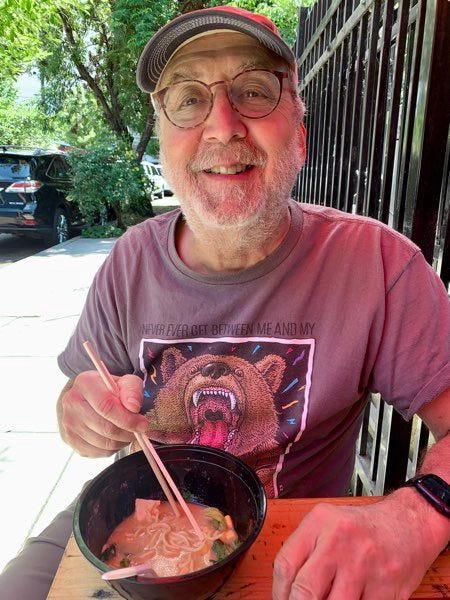This newcomer has been there before
Alaskan transplant Bob Weinstein makes neighborhood connection
If Portland’s new charter was designed to bring new voices into government, it may also welcome those who’ve been around the block.
Bob Weinstein was a four-term mayor, member of the city council and superintendent of schools in Ketchikan, Alaska, before moving to Portland’s Northwest District in 2018.
Weinstein got involved with his new neighborhood, becoming perhaps the city’s most zealous monitor of ill-parked and misused e-scooters. Now he’s taking on bigger game, running for City Council District 4, encompassing Portland’s Westside.
Concerns about the charter reform measure approved by voters in 2022 nudged him to get off the sidelines.
“It became clear that in 2024, we are at a crossroads in Portland with an election for mayor and 12 new council members,” he said.
While election of council members by district theoretically gives local issues a shorter pipeline to city hall, the system was not designed to empower neighborhoods or their representatives. Charter reform was drafted and promoted by activists who saw it as an antidote to neighborhood associations enjoying too much sympathy from city hall.
Former Commissioner Chloe Eudaly, who oversaw the city’s neighborhood program, “tried to rewrite the city code [in a manner that] “made plain her scorn for neighborhood associations, casting them as dominated by rich white people clueless about their misguided sense of entitlement,” Weinstein said.
Things did not improve after Eudaly was defeated for reelection and JoAnn Hardesty became the new commissioner of the program that had been renamed Office of Community and Civic Life. She retained the executive director hired by Eudaly, Suk Rhee, until Rhee resigned amid scandal.
“While they were in office, neighborhood associations were neglected, inadequately funded and even suppressed,” Weinstein said. “In sum, the consequences of the eight-year anti-neighborhood leadership of Chloe Eudaly and JoAnn Hardesty included a disconnect between the City Council and neighborhood priorities.
“As a council member, I would seek to rebuild trust and partnerships with neighborhood associations. I would have regular meetings and two-way communications with neighborhood associations. This would not only help allow empowerment of associations, it would also allow a continuous structural improvement [in the city as a whole].”
He didn’t like the proposed charter reform package from the start and worked against its passage. He sees flaws on many levels that could prove costly under inadequate leadership.
“It centralizes excessive power in the City Council,” he said. “By neglecting a mayoral veto—which had strong public backing—it weakens accountability and leads away from cooperative leadership. The mayor can break a tie vote, and that’s about it.”
That puts all policy development in the hands of a 13-member body that may include newcomers to governance, budget setting and goal-setting.
Weinstein also fears the new system overpays council members while limiting them on staffing to one assistant.
“I know what it takes to do constituent work,” he said, noting that was his job for six years under Alaskan U.S. Sen. Mark Begich.
“They’re creating a bloated bureaucracy in City Hall and hamstringing their ability to carry out their roles,” he said.
That bureaucracy will include several positions receiving salaries of nearly $300,000 a year.
He finds it ironic that the Small Donors Elections campaign financing program is being underfunded, reducing support for “candidates from diverse backgrounds to run for office and bring fresh perspectives to the table,” a central promise of charter reform.
His budget priorities include increases in core services, such as policing, fire and safety, transportation and homeless services. More fire stations are needed to ensure four-minute response times across the city. He believes Portland Street Response has been “reasonably successful” and needs more staffing.
“It’s time to admit that the status quo is not working,” his website states. “From 2015 to 2023, overall homelessness increased from 1,887 to 6,297 individuals, despite the city alone spending $1.7 billion on affordable housing and other services.”
He supports Built for Zero, an approach keeping track of individuals and outcomes to track their progress and measure success of the program.



